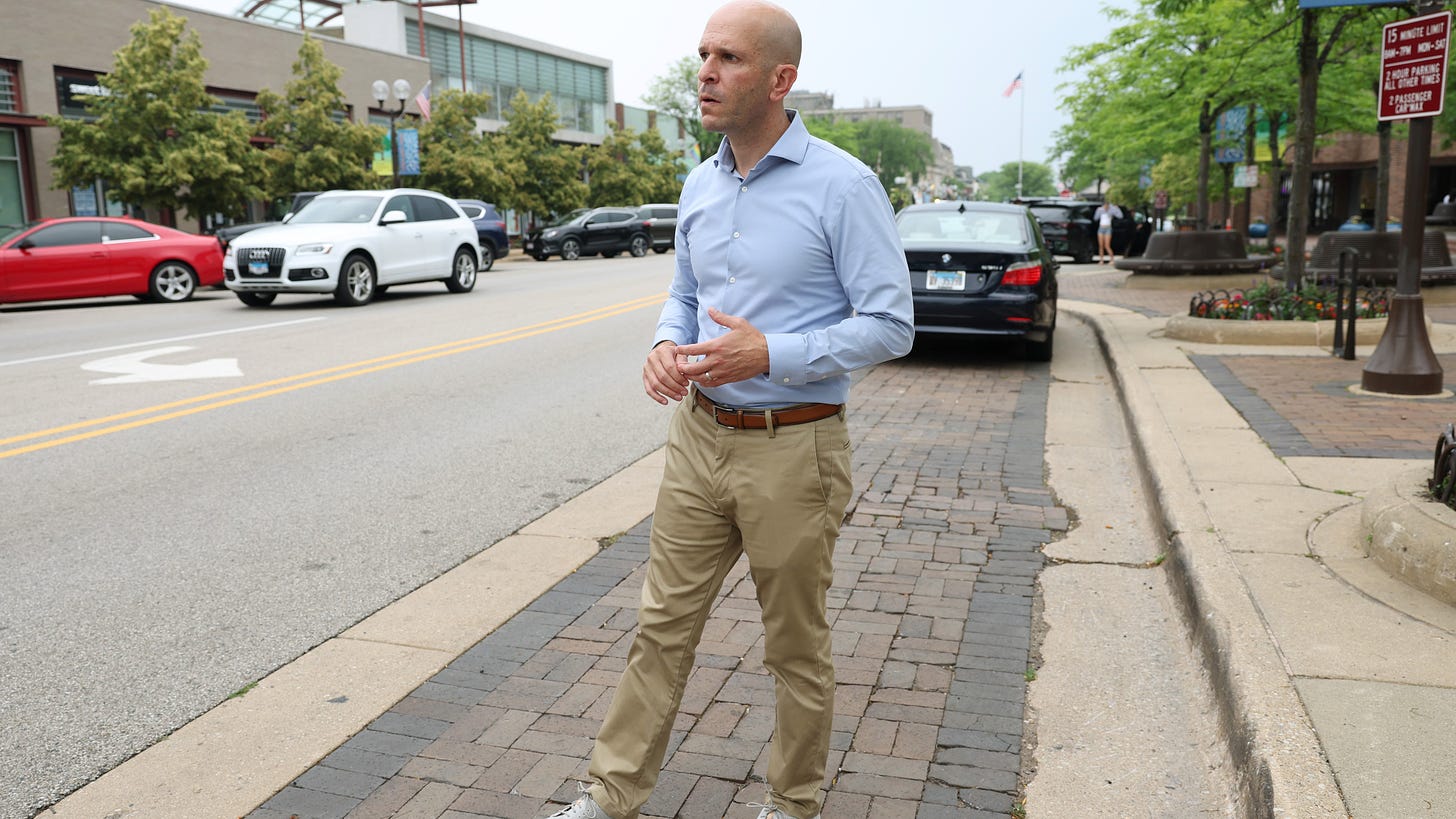THE ILLINOIZE: Monday Free for All...Highland Park...Gun ban in court...Gas and grocery taxes
July 3, 2023
Good morning, Illinois.
I caught a few minutes of the NASCAR race in downtown Chicago on the teevee yesterday afternoon. It was, of course, delayed by rain and was kind of a mess of a weekend, but when skies cleared last night, it really was a beautiful postcard to the city.
If anything, it could be a tourism generator.
With the Independence Day holiday falling on a Tuesday, it will mess with our publishing schedule a little this week. There won’t be a newsletter tomorrow or Wednesday (unless something crazy happens). We’ll be back Thursday.
This week only, we’re going to give you a 30 day free trial if you become a paid subscriber to the newsletter. It’s where all of our independent journalism and opinion content is published Tuesdays, Wednesdays, and Fridays.
Have a happy Independence Day holiday!
Let’s get to it.
YOUR MONDAY FREE FOR ALL
(note: we’re not responsible for paywalls and restrictions from other news outlets, because good journalism isn’t free)
Highland Park, a year later: Use of state’s ‘red flag’ gun laws jumps in wake of parade killings (Chicago Tribune)
In the immediate aftermath of last year’s mass shooting at Highland Park’s Fourth of July parade came the expected questions when such a tragedy unfolds: Who was the gunman? Where had his weapon come from?
And in Illinois, a state run by gun control-minded Democrats, could laws be bolstered and were police using them as effectively as possible?
Experts have suggested what was on the books — if properly understood and implemented — potentially could have prevented the alleged shooter from obtaining the high-powered semi-automatic rifle used to rain bullets down on paradegoers, killing seven and wounding dozens more.
Ensuing efforts centered on so-called red flag gun laws and other measures designed to take away firearms from those whose backgrounds suggest they should not have access to them. And a Tribune analysis of available state data shows that the push by politicians, advocates and police leaders to use them more often seems to have had an effect in the year since the mass shooting, including significant spikes in the use of the red flag laws and formal warnings to Illinois State Police about people who should not own firearms.
In a period running from approximately the date of the shooting through May 31, state police received more than 11,800 so-called clear and present danger reports, notifying them that someone might be too dangerous to be granted a gun license. That is more than double the number received during the same period the prior year, state data shows.
After the July 4 shooting, the state police codified in its administrative rules the agency’s ability to retain clear and present danger reports even if the subject doesn’t have a FOID card or a pending application on file and isn’t deemed to be an imminent threat. The agency would be able to use such reports in evaluating future FOID card applications.
According to the state police, as a result of the rule changes, it retained 6,413 clear and present danger reports that previously could have had to be discarded out of a total of 11,812 reports filed from July 1, 2022 through May 31. Those 6,413 reports represented instances where the subject did not have a FOID card or pending application.
Those 11,812 reports also resulted in 5,181 FOID cards being revoked or applications being denied, more than double the 2,378 revocations and denials during the same period the previous year.
Related: Highland Park parade shooting victim Nicolas Toledo’s family will always remember him as their hero (Chicago Sun-Times)
'A good day is a day we don't cry': Highland Park shooting survivors find strength -- and a new cause (Daily Herald)
‘The community stood behind us,’ say couple who owned Highland Park store from which shooter fired on Fourth of July parade (Chicago Sun-Times)
Highland Park after the mass shooting: A new film highlights the resilience of its residents. (WBEZ)
Brendan Kelly: Illinois State Police efforts are proof that we can make a difference in preventing gun violence (Chicago Tribune)
Federal appeals court considering Illinois assault weapons ban questions ‘popularity contest’ for guns (Chicago Sun-Times)
Chicago’s violent gangland history came to the forefront Thursday as federal appellate judges confronted lawyers challenging Illinois’ ban on assault weapons, passed in the wake of the mass shooting in Highland Park that is nearing its one-year anniversary.
Judges Frank Easterbrook, Diane Wood and Michael Brennan tussled with the argument that a U.S. Supreme Court decision last summer — and the Second Amendment itself — forbids governments from banning weapons that are “in common use.”
Easterbrook asked whether a Depression-era law against machine guns, following their use in Chicago’s notorious St. Valentine’s Day massacre and other mob hits, was unconstitutional.
“They were especially common in Chicago,” Easterbrook said of weapons like the Thompson submachine gun.
Core to Easterbrook’s question was the notion that governments lose the right to ban weapons once they become popular with the general public — something unlikely to occur if governments were to ban weapons before they hit the marketplace.
“It’s very troublesome to have a popularity contest decide a constitutional principle,” Wood remarked.
The discussion took place as the 7th U.S. Circuit Court of Appeals heard oral arguments in six consolidated lawsuits challenging Illinois’ assault weapons ban. When the hearing ended, Easterbrook summed it up as an “extremely difficult problem.”
It is not clear when the court will rule.
Illinois’ law bans the sale of assault weapons and caps the purchase of magazines at 10 rounds for long guns and 15 for handguns. Anyone who already owns the banned guns is allowed to keep them but required to register them with the Illinois State Police by Jan. 1.
Related: Appeals hearing asks whether a weapon’s popularity should exempt it from Illinois’ sweeping gun ban (Chicago Tribune)
After yearlong reprieve, Illinois grocery tax returns Saturday, while gas tax rises for second time this year (Chicago Tribune)
A key component of Democratic Gov. J.B. Pritzker’s $1.8 billion reelection year tax relief plan will come to an end on Saturday as consumers will again start paying a state tax on groceries, while at the same time seeing a hike at the gas pump for a second time this year.
The temporary tax breaks — the gas tax reprieve ended Jan. 1 — were passed last year amid soaring inflation and record-setting gas prices, and they provided major talking points for Pritzker and his legislative allies ahead of the Nov. 8 general election.
“What we did last year was a temporary measure because we had very high inflation,” Pritzker said during an unrelated news conference in Chicago on Tuesday. “Inflation, you may notice, has come down. But we had very high inflation, and we wanted to do everything that we could, and we provided $1.8 billion of tax relief for families across Illinois.”
At the end of May, inflation in the U.S. was at about 4%, compared with roughly 8.6% at the end of May 2022.
Pritzker last year justified the tax relief by saying he and the Democratic-controlled state legislature “balanced the budget, eliminated the bill backlog and state government is now running a surplus.”
Republicans were dismissive of the tax relief, calling it an election-year ploy.
Income from the 1% tax on groceries that was suspended last July 1 and will be reinstated on Saturday goes exclusively to municipal governments. While the tax was on hiatus, the void was filled from a pool of $400 million in the state’s general revenue fund.
Related: Cash in, cash out: Minimum wages rise, but so do gas and grocery taxes (Chicago Sun-Times)
Opinion: When Election Year Gimmicks Only Help Politicians (The Illinoize)
TOP LINKS FROM LAST WEEK
POLITICAL POTPOURRI
Bill to stop student ticketing suffers setback, delaying action to protect families from costly fines (Chicago Tribune)
Illinois will release less abortion data in an effort to protect patients and providers (WBEZ)
Illinois to make standard driver’s licenses available to noncitizens regardless of immigration status (Capitol News Illinois)
Illinois teen in protective custody has been stuck for a year in a St. Louis hospital room (St. Louis Post-Dispatch)
State's top banking regulator joins Johnson's administration (Crain’s Chicago Business)
Illinois to offer credit monitoring for those affected by cyberattack against state and others (Chicago Tribune)
State’s ‘rainy day’ fund hits record-high balance ahead of new fiscal year (Capitol News Illinois)
The new fiscal year began Saturday. What does that mean for Springfield? (State Journal-Register)
Despite opposition, CO2 pipelines are pushing forward in Illinois. Here's what's next (Peoria Journal Star)
U.S. Rep. Sean Casten tells Alsip town hall manufacturing surging, but employers still have trouble filling jobs (Daily Southtown)
Editorial: Pritzker made a sensible compromise on health care for undocumented immigrants (Chicago Sun-Times)
Editorial: One step forward, two steps back in state's financial fix (Champaign News-Gazette)
Editorial: A GOP bill offers teens serving long prison terms a second chance. It should become law. (Chicago Tribune)
Editorial: Increasingly 'convoluted' stadium discussions keep pushing Bears decision back (Daily Herald)
Opinion: Inspired by FBI tape recordings (Champaign News-Gazette)
JOIN US












